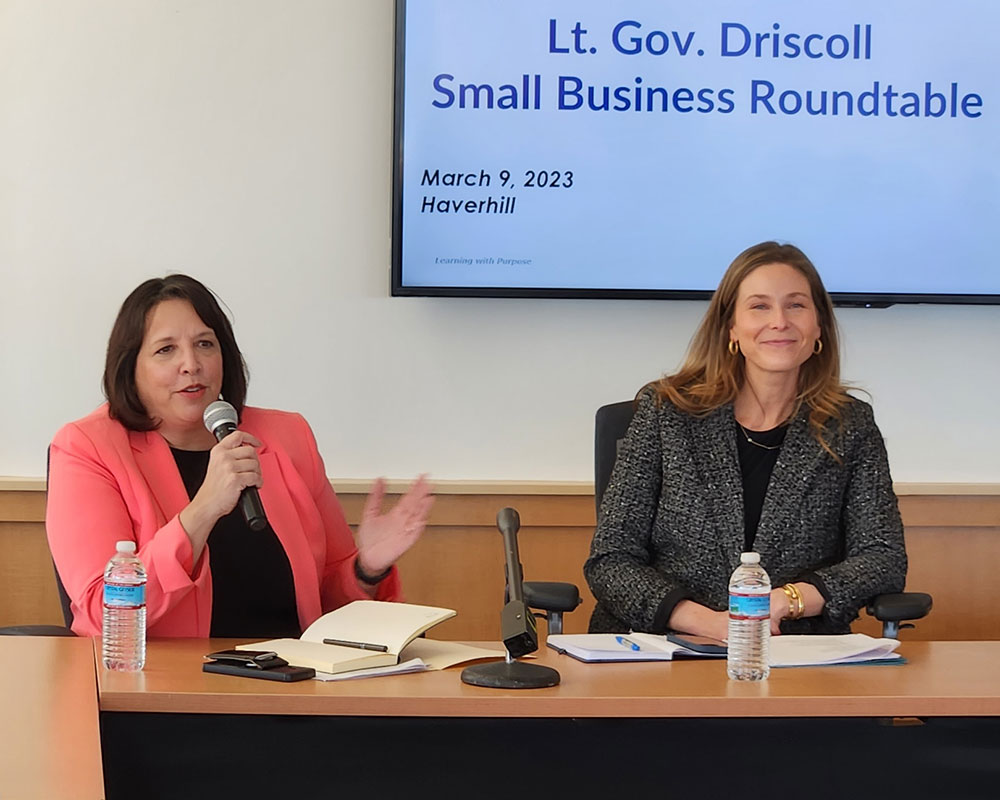Additional photographs below.
A cross section of businesses credited state and local incentives and guidance Thursday in helping them set up shop in Haverhill.
At a roundtable in downtown Haverhill, Lt. Gov. Kimberley Driscoll and Community Development Undersecretary Ashley Stolba listened to stories about what works, but also heard suggestions for making improvements. She called Haverhill’s success during the pandemic a model for the state.
“We’re not quite sure, 100% what the new, post-pandemic economy looks like so we’re in the transition phase. How do we approach it and use some of the resources, frankly, that we’re lucky enough to have? Federal resources and, frankly, a state that continued to do well throughout this pandemic. How do we think about the long-term economic prosperity that we can prepare for? So, when things slow down—and some would argue that they’re slowing down right now or have slowed down—that we’re ready and able to rebound for whatever comes next,” she said.
Two companies—Edwards Vacuum and Rapid Coatings—that recently relocated to Haverhill cited city and state government help for their successful transitions. John Tremblay, project manager, spoke for Edwards Vacuum.
“The reason Edwards Vacuum came to Haverhill and stayed in Massachusetts—they had a reason to look elsewhere—was really because of the (state) business development group—Sue Whitaker, Peter Milano—we started talking to them right off the bat. They introduced us to the City of Haverhill. The mayor and his team were excellent and, throughout our whole process, we had a lot of ups and downs, the support that we got from the state and great support that we got from the city, really helped land us here in Haverhill,” he said.
Many roundtable participants pointed to a shortage of workers as a key problem, but not Mike Brown of Rapid Coatings. He said his company, which moved from Woburn to Haverhill’s Ward Hill Business Park, has no problem recruiting employees likely because it embraces Spanish-speakers. He credited Haverhill Assistant Economic Development Director Pamela Price for making connections and MakeIT Haverhill and Northern Essex Community College for their English programs.
“We in particular found Haverhill very receptive to us in the process of looking for a facility, ultimately moving here in September. It’s just been a great setup for us in Haverhill,” he said.
Driscoll also invited business leaders to express concerns.
“We have quite a lot of industries that quite haven’t had their Kitty Hawk moment, but they’re close and we want to try and support those. We know that small businesses are up against it,” she told the group.
Haverhill Mayor James J. Fiorentini checked off problem list items.
“Supply chain problems. Inflation problems. Not being able to find enough help problem—who’s got that problem? Then, we got the problem of unemployed people who can’t get to work,” he said.
He added there’s not enough housing and not enough places for businesses that want to come here.
Haverhill City Councilor Melinda E. Barrett called for getting resources to businesses moving into growth stages.
Rich Breault, president of Lightspeed Manufacturing in Ward Hill, credited Haverhill City Councilor John A. Michitson for bringing the startup community here. He agreed, however, the next challenge is to help these businesses scale up. He noted Seth Cordes’ startup, Uncommon Catalyst, outgrew its UMass Lowell iHub space and was able to find space on the fifth floor of Harbor Place, but expressed concern not enough space is available for others to grow in Haverhill.
MakeIt Haverhill founder Keith Boucher suggested a particular missed opportunity could end up helping his group make more progress. “We’re hoping at some point in time to be able to get more money or get money from the Workforce Investment Board since it seems like they gave back money to the Department of Labor over a period of time. That’s not really a good thing,” he said.
Katrina Hobbs-Everett, founder of Coco Brown coworking space, said officials would do well to better support minority-owned businesses.
“It’s about supporting the businesses that come as well. A large part of that is due to some connectivity happening. I know you. You support me. That has not been true for (Black, Indigenous and People of Color) BIPOC folks.
She added other impacted business groups are those owned by the LGBTQ+ and gender non-conforming communities.


